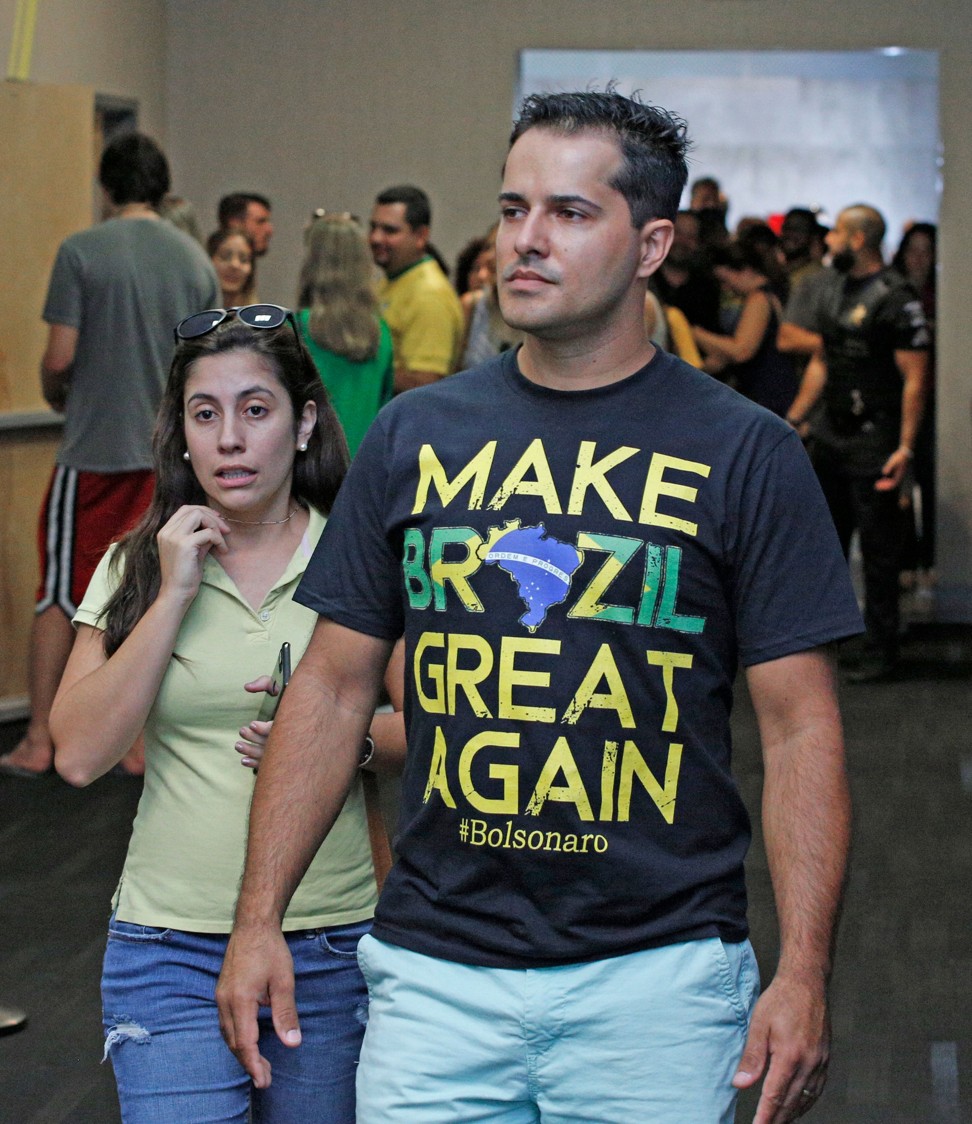
Brazil heads to election run-off after Trump-like candidate Jair Bolsonaro dominates first round
Jair Bolsonaro, a 63-year-old former paratrooper vowing to crush crime, received 46 per cent of ballots – below the 50 per cent, plus one vote threshold required for a first-round win
Jair Bolsonaro, the divisive, far-right former Army captain, stormed to a huge lead in the first round of Brazil’s presidential elections Sunday as voters enraged by years of recession, corruption scandals and soaring crime rallied around his strongman message.
The result puts the seven-time congressman on track for victory in the decisive, second-round vote on October 28, when he will face his closest challenger, the Workers’ Party candidate Fernando Haddad.
Bolsonaro’s domination Sunday was so overwhelming that it briefly appeared that he might capture enough votes to forego the need for a run-off round – something that hasn’t happened for 20 years.
In the end, he wound up with 46.2 per cent, just short of the majority needed to win outright, to Haddad’s 29.1 per cent, electoral officials said.
In a live broadcast on Facebook after the results came through, Bolsonaro appeared to question the legitimacy of the results but indicated he was preparing for the second round.
He said that Brazilians now had to choose between the values he represents – “family, God and justice” – or becoming Venezuela.
The next three weeks promise to be intense. For while Bolsonaro’s lead appears almost insurmountable, the millions of Brazilians who vehemently oppose his populist candidacy – and its undertones of misogyny, homophobia and dictatorship denial – will make a furious, last-ditch effort to halt his march to the presidency.

But they will be fighting against powerful forces not entirely dissimilar to those that helped put Donald Trump in office in the US and Andres Manuel Lopez Obrador in Mexico and gave the UK its Brexit shock.
“It’ll be three weeks of a dangerous and highly polarised scenario,” said Mauricio Santoro, a political scientist at the State University of Rio de Janeiro.
“The level of conflict will be very high,” he said, adding that both have to overcome very high rejection rates to win.
Allies of the ex-Army captain performed strongly in the congressional races, and two of his sons won election.

In the second round, both men will have equal television time, meaning they will be far more exposed to the electorate than during the first round, when 13 candidates were vying for the presidency.
For Haddad, the key question is whether he can emerge from the shadow of former president Luiz Inacio Lula da Silva, who is now in jail for corruption and money-laundering.
The former education minister’s meteoric rise in the polls ahead of Sunday’s vote was almost entirely due to the Workers’ Party building its campaign on the slogan “Haddad is Lula”.
But while Lula still inspires a devoted following, others revile him as head of the party that created a massive corruption scandal and oversaw the country’s worst recession on record.
Ciro Gomes, the third-placed candidate with 12.5 per cent, has already indicated he will support Haddad in the second round, but combined their votes still fall significantly short of Bolsonaro’s total.
Better-off Brazilians have rallied to Bolsonaro’s pledge to crush crime in a country where there are more than 62,000 murders each year, nearly as many rapes, and frequent muggings and robberies.
Bolsonaro wants to boost police forces and relax gun laws for “good” citizens.
Many voters also like his promises to tackle corruption and to cut climbing public debt through privatisations, as well as the devout Catholic’s family-first stance.
But poorer Brazilians, who benefited most from the heyday during Lula’s time in office from 2003 to 2010, want a return to good times and hope Haddad can deliver.
Despite sitting in congress for nearly three decades, Bolsonaro casts himself as a political outsider in the mold of Trump or the Philippines’ Rodrigo Duterte: tough-talking, brash, and promising a root-and-branch overhaul to an electorate weary of traditional parties spouting empty promises.
The outgoing centre-right President Michel Temer – who took over after Lula’s chosen successor Dilma Rousseff was impeached and ousted in 2016 for financial wrongdoing – was not standing for re-election.
He will leave office at the end of the year as a deeply unpopular figure in a country with 13 million unemployed, climbing public debt and inflation, and record violence.
Additional reporting by Agence France-Presse

